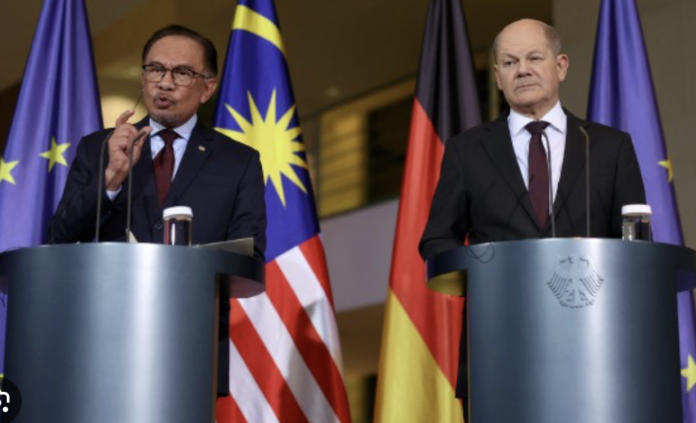KUALA LUMPUR, March 30 – After Prime Minister Datuk Seri Anwar Ibrahim’s strong criticism against Western nations over Gaza during his recent visit to Germany, and with international outrage growing over rising Palestinian fatalities, an article in The New York Times says Germany’s tone on support for Israel has shifted.
Its Berlin-based correspondent Erika Solomon wrote on Friday: Germany increasingly feels awkward in its position as a strong ally of Israel.
“Days after Hamas launched its Oct 7 attacks on Israel, Germany’s chancellor, Olaf Scholz, was one of the first Western leaders to arrive in Tel Aviv. Standing beside the Israeli prime minister, Benjamin Netanyahu, he declared that Germany had ‘only one place — and it is alongside Israel’.
“That place now feels increasingly awkward for Germany, Israel’s second-largest arms supplier and a nation whose leadership calls support for the country a ‘Staatsräson’, a national reason for existence, as a way of atoning for the Holocaust.
“Last week, with Israel’s deadly offensive continuing in Gaza, the chancellor again stood next to Mr Netanyahu in Tel Aviv, and struck a different tone. ‘No matter how important the goal,’ he asked, ‘can it justify such terribly high costs?’”
Interestingly, the article also pointed to a strong point brought home during Anwar’s visit to Berlin earlier this month where he had criticised Western countries for their lack of action against Israel’s atrocities in Gaza.
The article quoted Anwar’s words to the media as he stood beside Scholz: “The sense of diminishing credibility on human rights is particularly strong in the set of developing or underdeveloped countries sometimes referred to as the Global South.
“We oppose colonialism, or apartheid, or ethnic cleansing, or dispossession of any country, be it in Ukraine, or in Gaza.
“Where have we thrown our humanity? Why this hypocrisy?” Anwar asked.
The article also stated that Germany’s Foreign Minister Annalena Baerbock would be sending a delegation to Israel because as a signatory to the Geneva Conventions, her country “is obliged to remind all parties of their duty to abide by international humanitarian law”.
During a visit to the region, her sixth since the attack, Baerbock also described the situation in Gaza as “hell” and insisted that a major offensive on Rafah, where more than a million people have sought shelter, must not happen.
“People cannot vanish into thin air,” she said, voicing her concern over the fate of Palestinians and Israel’s ruthlesness.
However, the article also mentioned that beyond a change in tone, there is little Berlin is likely to do that is not symbolic, unless the United States takes tougher measures.
The article pointed out the most important decision it could make quoting Jürgen Hardt, the foreign policy spokesman for the centre-right Christian Democrats in the Parliament, was to restore funding to the main UN agency aiding Palestinians, UNRWA.
Meanwhile, former ABIM president and current Bersih chairman Muhammad Faisal Abdul Aziz referenced the article in a post on X (formerly Twitter), suggesting that Anwar’s bold criticism may have prompted Germany to reconsider its stance on Israel.
“We denounce the differing political ideologies, the prime minister’s courage is something that is to be praised and it had helped to bring some changes in Germany’s stand over its close ally Israel.
“Moving forward, I forsee Malaysia being in the centre of attention and a global player especially in the Palestine and humanitarian issues,” he said.



















